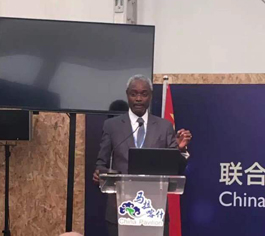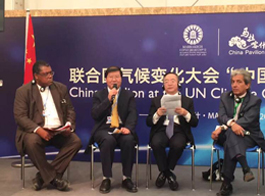On 14 November 2016, UN Environment launched a decade-long (2016-2025) flagship programme on Climate, Ecosystems and Livelihoods (CEL), supported by China and designed to assist countries in the Global South with effective delivery of the Sustainable Development Goals (SDGs) and climate targets while improving the livelihoods of their people and protecting their ecosystems.
The flagship programme aims to seize the ‘power of integration’ of the SDGs, and will be led by UN Environment’s International Ecosystem Management Partnership (UNEP-IEMP). UNEP-IEMP is a joint venture between UN Environment and Chinese Academy of Sciences (CAS), hosted by the Institute of Geographic Sciences and Natural Resources Research of CAS.
 |
|
Ibrahim Thiaw launching the CEL flagship ( Image by IEMP) |
UN Environment deputy chief, Ibrahim Thiaw, joined by several ministers and heads of UN and government agencies announced the flagship programme at the High-Level Forum on South-South Cooperation on Climate Change at the Marrakech climate conference-UNFCCC COP22.
“It’s the poor in developing countries who are most vulnerable to the impact of climate change on the ecosystems they depend on to for food, shelter and livelihoods,” said Mr. Thiaw. “That is why I am delighted to announce the new 10-year programme on Climate, Ecosystems and Livelihoods along the Silk Road. It will not just benefit national targets, it will benefit real people.”
“It will not only cement China’s commitment to global leadership in tackling climate change and the environment, but also our shared determination to generate even more results through South-South Co-operation.”
The new programme is a crucial element of long-term cooperation between China and UN Environment to achieve the Sustainable Development Goals – a set of 17 global objectives ranging from eliminating poverty
 |
|
LIU Jian speaking about CEL at the SSCCC forum |
and hunger to protecting biodiversity and combating climate change, to be achieved by 2030.
“This flagship programme is a testimony of our determination to make a real impact and provide long-lasting assistance in improving livelihoods through ecosystem conservation and restoration, while responding to the impacts of climate change,” said the Director of UNEP-IEMP, LIU Jian.
“We are committed to dedicate all our efforts to work with people and institutions in the poorest and most vulnerable settings, with assistance from both Northern and Southern partners.”
CEL will draw on the globally relevant knowledge, expertise and other resources of its core team and network of international partners. The Chinese Ecosystem Research Network, part of the Chinese Academy of Sciences and one of the largest national ecosystem monitoring and research network in the world will provide technical support for the programme.
The flagship programme aims to protect the most fragile ecosystems, such as drylands, river basins and coastal zones in Asia, West Asia and Africa. It will be rolled out in three phases: Assessment (2016-2018), Development (2019-2021) and Scaling up (2022-2025).
The first phase of the programme will see a thorough survey of three types of “hotspots” — fragile ecosystems, biodiversity-rich areas and communities vulnerable to climate change and ecosystem degradation.
The survey will be focused on the countries lying along the land and sea routes of the "New Silk Road" – an international connectivity and cooperation framework proposed by China.
During the entire duration of the programme, UNEP-IEMP will be providing countries with assistance in monitoring and assessment, capacity building, technology demonstration and science for policy.
UNEP-IEMP team at COP 22 is led by Dr LIU Jian and Prof ZHANG Linxiu, Co-directors of UNEP-IEMP.
To know more about CEL, please visit: http://unep-iemp.org/programmes/flagship-programme-on-climate-ecosystems-and-livelihoods-cel/